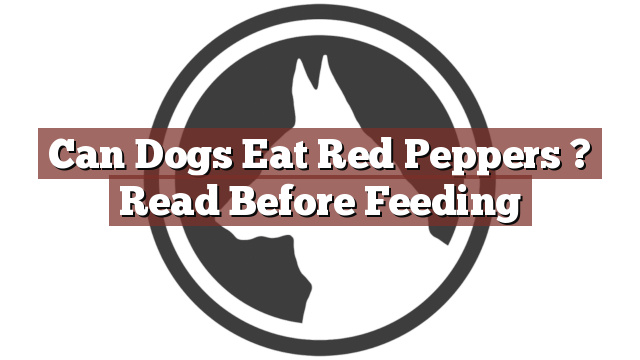Understanding Your Dog’s Dietary Needs
As a dog owner, it is important to be aware of your furry friend’s dietary needs. While dogs are primarily carnivores, their bodies can also handle certain fruits and vegetables. However, not all human foods are safe for dogs to consume. It is crucial to understand which foods are safe and beneficial for your pet’s health. Red peppers are a popular vegetable found in many households, and you might be wondering, can dogs eat red peppers?
Can Dogs Eat Red Peppers? Read Before Feeding
Can dogs eat red peppers? The answer is yes. Dogs can eat red peppers, as they are not toxic or harmful to them. In fact, red peppers are rich in vitamins A and C, which are essential for a dog’s overall health. These vitamins help boost their immune system, support healthy vision, and promote cell growth. Red peppers also contain a good amount of fiber, which aids in digestion and can help prevent constipation in dogs. However, it is important to note that red peppers should be given to dogs in moderation and in a proper form.
Pros and Cons of Feeding Red Peppers to Dogs
Feeding red peppers to your dog comes with both pros and cons. On the positive side, red peppers provide a nutritious snack option for your pet. They contain low calories and are a great source of antioxidants, which can help fight against the damaging effects of free radicals in a dog’s body. Red peppers also have a high water content, which can help keep your dog hydrated.
Despite the benefits, there are some factors to consider before introducing red peppers into your dog’s diet. Some dogs may have sensitive digestive systems and may not tolerate red peppers well, leading to gastrointestinal upset or diarrhea. Additionally, it is crucial to remove the seeds and stem of the red pepper before feeding it to your dog, as these parts can be difficult for them to digest and may pose a choking hazard.
Conclusion: Weighing the Benefits and Risks
In conclusion, dogs can eat red peppers, and they can be a healthy addition to their diet when given in moderation. The vitamins and antioxidants found in red peppers can provide numerous health benefits for your furry friend. However, it is important to take into consideration your dog’s individual tolerance and any potential gastrointestinal issues that may arise. As with any new food, it is advisable to introduce red peppers gradually and monitor your dog’s reaction. If you have any concerns or questions, it is always best to consult with your veterinarian to ensure the well-being of your beloved pet.
Thank you for taking the time to read through our exploration of [page_title]. As every dog lover knows, our furry friends have unique dietary needs and responses, often varying from one canine to another. This is why it's paramount to approach any changes in their diet with caution and knowledge.
Before introducing any new treats or making alterations to your dog's diet based on our insights, it's crucial to consult with a veterinarian about [page_title]. Their expertise ensures that the choices you make are well-suited to your particular pet's health and well-being.
Even seemingly harmless foods can sometimes lead to allergic reactions or digestive issues, which is why monitoring your dog after introducing any new food item is essential.
The content provided here on [page_title] is crafted with care, thorough research, and a genuine love for dogs. Nevertheless, it serves as a general guideline and should not be considered a substitute for professional veterinary advice.
Always prioritize the expert insights of your veterinarian, and remember that the health and happiness of your furry companion come first.
May your journey with your pet continue to be filled with joy, love, and safe culinary adventures. Happy reading, and even happier snacking for your canine friend!

